|
 Clitocybe clitocyboides Clitocybe clitocyboides
SynonymsLeucopaxillus otagoensis
Agaricus clitocyboides
BiostatusPresent in region - Indigenous. Non endemic
Images (click to enlarge)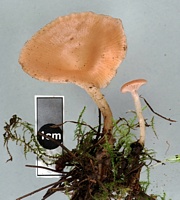
Owner: J.A. Cooper | 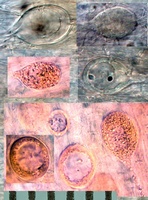
Caption: 'cystidia' in cap tissue
Owner: J.A. Cooper | 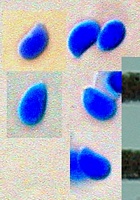
Caption: spores
Owner: J.A. Cooper | 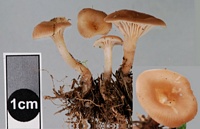
Owner: J.A. Cooper | 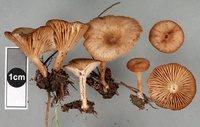
Owner: J.A. Cooper | 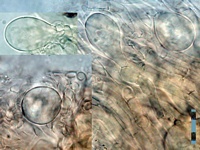
Caption: subepidermal cystidia-like elements.
Owner: J.A. Cooper | 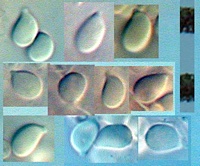
Caption: spores
Owner: J.A. Cooper | 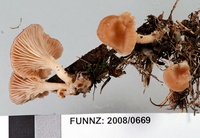
Owner: J.A. Cooper | 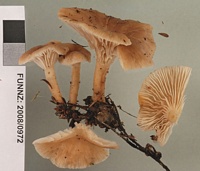
Owner: J.A. Cooper | 
Caption: Fig. 39 | 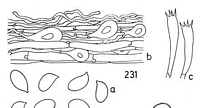
Caption: 231-Clitocybe clitocyboides [Leucopaxillus otagoensis Stevenson]: a. spores; b. cuticle; c. basidia. | 
Caption: 231-Clitocybe clitocyboides [Leucopaxillus otagoensis Stevenson]: a. spores; b. cuticle; c. basidia. | |
Article: Stevenson, G. (1964). The Agaricales of New Zealand: V. Kew Bulletin 19(1): 1-59.
Description: Pileus 2-4 cm diam., ochraceous salmon, infundibuliform with downrolled margin, smooth, silky; flesh whitish. Gills decurrent, pale ochraceous, shallow, rather crowded, repeatedly forking. Stipe 1-3 cm x 3-4 mm, pale ochraceous salmon, smooth to velvety with a weft of hyphae at the base, solid, fleshy. Spores 6-8 x 3-4 µm, amyloid (Fig. 39).
Habitat: In forest soil, Woodside, Dunedin, 1.7.1953, M. Morrison in Stevenson (type).
Article: Horak, E. (1971). A contribution towards the revision of the Agaricales (Fungi) from New Zealand. New Zealand Journal of Botany 9(3): 403-462 (http://www.rsnz.org/publish/abstracts.php).
Notes: Leucopaxillus otagoensis Stevenson (29 D) Fig. 20 = Clitocybe clitocyboides
(Cooke and Massee) Pegler, 1965
It is difficult to see why this fungus was originally described in Leucopaxillus for
apart from the decurrent gills, it has nothing in common with that genus. C.
clitocyboides closely resembles C. hydrogramma (Fries) Singer even to the
distinct chlamydospores embedded between hyphae of the cuticle. All characters
of the N.Z. species correspond well with those of the type from Australia.
|